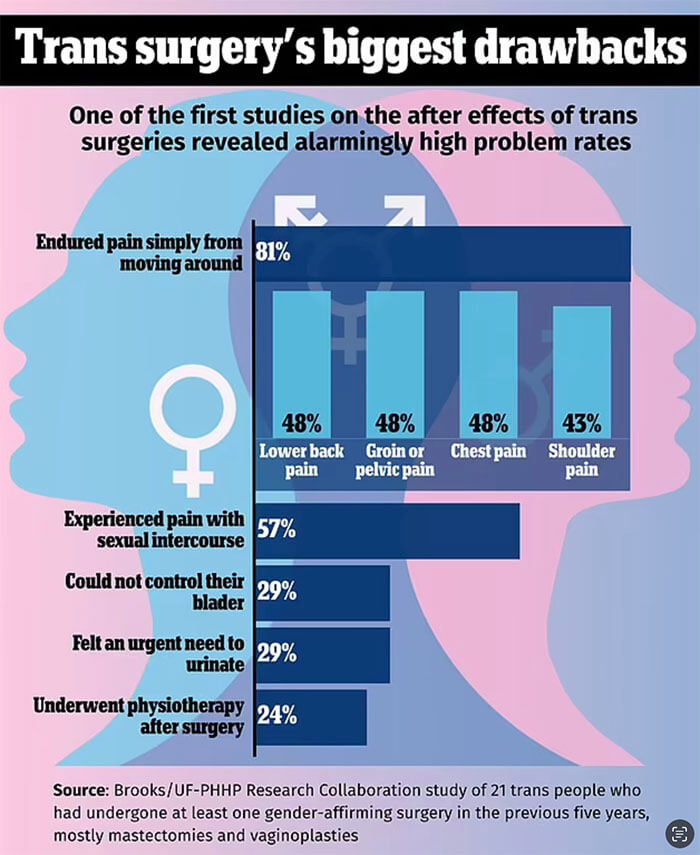Trans surgery nightmares – 81% endure pain after gender-change, many are left incontinent
What the Ministry of Health, mainstream media and trans activists won’t tell you…
One of the first studies into the side effects of transgender surgeries has revealed alarmingly high rates of post-op pain, aching during intercourse, and bladder problems.
81 percent of those who had gender-affirming surgery said they endured pain simply from moving around. More than half of trans surgery patients endured pain during sex, and nearly a third could not control their bladders.
Source: Physical Therapy and Rehabilitation Journal
The pain was experienced across body regions after surgery for both feminizing and masculinizing procedures. Vaginal stenosis and incontinence were the most common complications reported. A Vaginoplasty is the procedure to construct a vagina, whereas a Phalloplasty is the procedure to construct a penis. Both procedures are controversial and problematic.
This is frightening stuff. “Gender Affirming Care” should be renamed Sterilisation and Castration.

Read full story, first published in Daily Mail:
EXCLUSIVE: Trans surgery nightmares revealed: 81% endure pain in the five years after gender-change procedures, more than half say having sex is painful – and a third are left incontinent, survey shows
One of the first studies into the side effects of transgender surgeries has revealed alarmingly high rates of post-op pain, aching during intercourse, and bladder problems, raising troubling questions for this new frontier of medicine.
A huge majority – 81 percent – of those who had gender-affirming surgery in the past five years said they endured pain simply from moving around in the weeks and months after going under the knife.
Researchers from the University of Florida and Brooks Rehabilitation, a health non-profit, showed that more than half of trans surgery patients endured pain during sex, and nearly a third could not control their bladders.
Dr Meryl Alappattu, a UF physiotherapy professor, said she would publish her report later this year, but released provisional findings in a private online workshop that DailyMail.com was able to attend.
‘There is a high percentage reporting musculoskeletal pain, difficulty moving, and pelvic floor dysfunction,’ said Dr Alappattu, adding that more research is needed in a poorly-understood area.
‘In terms of getting information related to the efficacy of these types of treatments … we still have a lot of work to do.’
Surgically altering male and female genitals to match those of the opposite sex — known as vaginoplasties and phalloplasties — are widely understood to be tough and problematic procedures.
Women who transition to become men may opt to have a penis constructed from tissue extracted from their arms, although this procedure is also complex, and the result is still markedly different to a biological penis.
Removing the breasts of female-to-male transitioners is simpler, but can also lead to pain, infections, and such problems as stitches bursting apart, particularly on overweight patients.
The procedures are a hot-button issue in America’s culture wars, especially those on children.
UF researchers studied 21 trans and non-binary people aged between 20 and 70 who had undergone trans surgeries in the past five years — mostly mastectomies and vaginoplasties.
81 percent endured pain in their lower back, groin, pelvis, chest, or shoulders in the weeks, months, and even years after their procedures, researchers found.
Another 57 percent found sexual intercourse painful.
Meanwhile, 29 percent suffered urinary incontinence or a frequent and urgent need to go to the bathroom, researchers found.
In all, only a quarter saw a physiotherapist to overcome their problems.
Dr Alappattu said physiotherapy could repair some damage, but that more research was needed into recovery times and the longer-term impacts of trans surgeries.
Dr Alexandra Hill, a UF expert on pelvic problems, described trans patients being surprised by their protracted recoveries, which in some cases lasted longer than the 6-8 weeks they expected.
‘Sometimes it takes much longer than people had initially anticipated to get back to doing things they like to do,’ Dr Hill told the online gathering.
Likewise, many male-to-female transitioners who get a neo-vagina created are surprised to discover that they have to insert a ‘dilator’ into their canal for up to an hour each day after surgery.
Without using a dilator, which resembles a sex toy, the neo-vagina can gradually shorten in depth, said Dr Hill. Some trans women must use them for the rest of their lives.
‘That’s something a lot of people don’t realize,’ she added.
Advocates of trans medicine present the surgeries as a trade-off, acknowledging the substantial drawbacks, but saying they’re vital for those with serious discomfort with their own body.
Even so, they are rare within the transgender community.
Of the estimated 1.6 million trans and non-binary Americans aged 13 and above, only 31 percent take cross-sex hormones and 16 percent opt for surgery, according to research by the Washington Post and KFF, a health charity.
Most surgeries are breast removals for female-to-male transitioners.
Genital surgeries are rare and controversial. Even the World Professional Association for Transgender Health, which advocates for gender-affirming care globally, says procedures should not be attempted on children.
Critics warn invasive, heavy-duty procedures on youngsters who are still physically-developing can set them up for a lifetime of dysfunction.
Jazz Jennings, a transgender girl, suffered a torn vagina after undergoing sex change surgery at the age of just 16.
Experts warn youngsters may have insufficient skin on their penises or scrotums to help construct a so-called neo-vagina.
The problem is even worse in children who have taken puberty blockers, as their privates remain even less developed and there is less material for the surgeon to work with.
Gender reassignment surgeries can stop recipients from being able to derive any sort of sexual pleasure as an adult, if the surgeries take place before patients’ genitals have fully-formed.
Republicans have sought to ban gender-affirming drugs and surgeries for children and even some adults in about 20 states this year.






